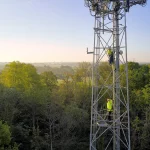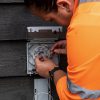Ookla Claim Quarter of UK Smartphone Users Suffer Network Outage at Least Once a Month

A new survey of over 1,000 UK smartphone users by Omdia, which was commissioned by network testing firm Ookla (i.e. Speedtest.net, Downdetector.co.uk), has revealed some of the biggest frustrations that UK Smartphone users have with their devices, with spam calls and messages, slow-loading web pages, and network outages as the top pain points.
The admittedly very small survey (i.e. take its results with a pinch of salt) – ‘Smartphone User Trends‘ – claims to have found that 27% of UK smartphone users are experiencing a “network outage” at least once a month and 81% of those are considering switching mobile operators due to poor handling of such outages.
More widely, over a quarter of UK respondents said they were likely to switch mobile providers in the next 12 months, with 54% citing cost savings as the main reason for switching. “As network outages and cost concerns mount, UK smartphone users are more inclined to consider switching providers,” said Luke Kehoe, industry analyst for Europe at Ookla. “Mobile operators in the UK need to differentiate themselves by addressing these pain points to better serve their customers and reduce churn.”
Advertisement
Summary of Key Findings
➤ Frequent network outages impacting user experience: 27% of UK respondents reported experiencing a network outage at least once a month, and 11% faced outages multiple times each month. Network outages were cited as the biggest frustration for 16% of UK respondents.
➤ High likelihood of switching providers: 26% of UK respondents indicated that they are likely or very likely to switch their mobile service provider within the next 12 months.
➤ Frustrations with slow web pages and interrupted streaming: Quality of experience issues like slow-loading web pages and interrupted video streams also proved frustrating, affecting 38% and 19% of users respectively.
➤ Users want more from their mobile contracts: While 54% of UK respondents cited cost savings as their primary motivation for switching providers, 20% are looking for better bundled content, 32% are looking for faster network speeds, and 27% want better reception.
➤ Communication from operators around outages: 89% of UK respondents noted that receiving notifications and status updates about network issues is important or very important to them.
➤ Speed and quality: For UK respondents, having a faster network and receiving better coverage were more important than promotional offers. Nearly a third (32%) of UK respondents, who are looking to switch providers, will do so because they want to get better speed from their mobile connection, and 27% want to improve their coverage experience.
➤ Ability to upgrade: UK consumers surveyed said that the ability to upgrade to the newest device is the least important consideration when selecting a mobile service provider, with only 14% citing it as “critical”.
➤ Consumer blame doesn’t always fall to operators: Although 57% of UK consumers surveyed said they blamed their mobile/home internet service provider when issues are experienced with streaming content, 19% said they would blame their device and a further 24% said they’d blame the streaming platform.
Kehoe added: “Ongoing frustrations with slow-loading webpages and interrupted video streaming highlights the importance of addressing bread-and-butter quality of experience (QoE) issues, even on faster 5G networks. Operators that can demonstrate the superior coverage and performance credentials of their networks, including ensuring there is proactive communication when outages arise, have a clear strategic opportunity to win the hearts of frustrated consumers.”
The catch here is with how you define a “network outage” when moving within a mobile network environment, where signal and service quality can vary significantly between locations, both indoors and outdoors. Not to mention the potential for faults on the Smartphone itself. Naturally, there are some limitations of mobile connectivity that cannot be easily overcome in every scenario, at least not in a way that would be considered economically or even practically viable for commercial operators.
The actual number of real network outages, such as where the network itself fails due to a fault within the operator’s network (as opposed to a failure of the device itself or when moving into an area of weak signal), is usually very low. But experiences do vary between locations, although we tend to only see a handful of major national-scale service disruptions each year.
Mark is a professional technology writer, IT consultant and computer engineer from Dorset (England), he also founded ISPreview in 1999 and enjoys analysing the latest telecoms and broadband developments. Find me on X (Twitter), Mastodon, Facebook, BlueSky, Threads.net and Linkedin.
« Brsk Name 5 Areas in Rural West Yorkshire UK for FTTP Broadband Build






















































I see they’ve used VMO2 then!
Yeah I’m guessing some are merging Network Outage & a place with no coverage. All 4 MNOs – Mobile Network Operators have pieces with no signal.
Outages happen & people get far too stressed about it, probably missing the dull updates on Instagram and Facebook!
It does help to change MNO or MVNO for cheaper plans but then staying one can also get decent offers.